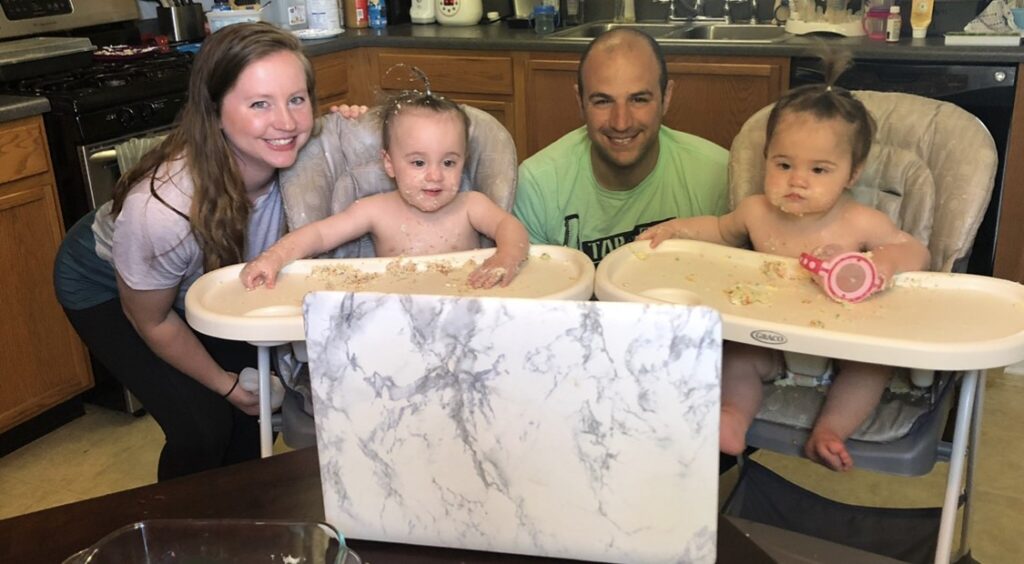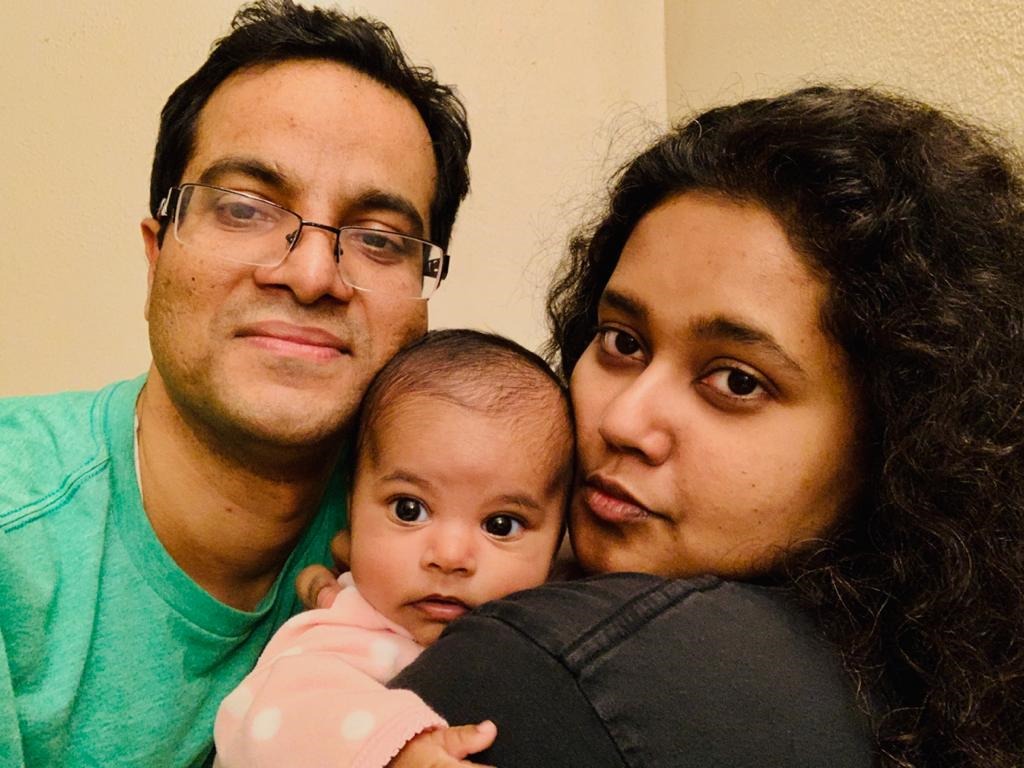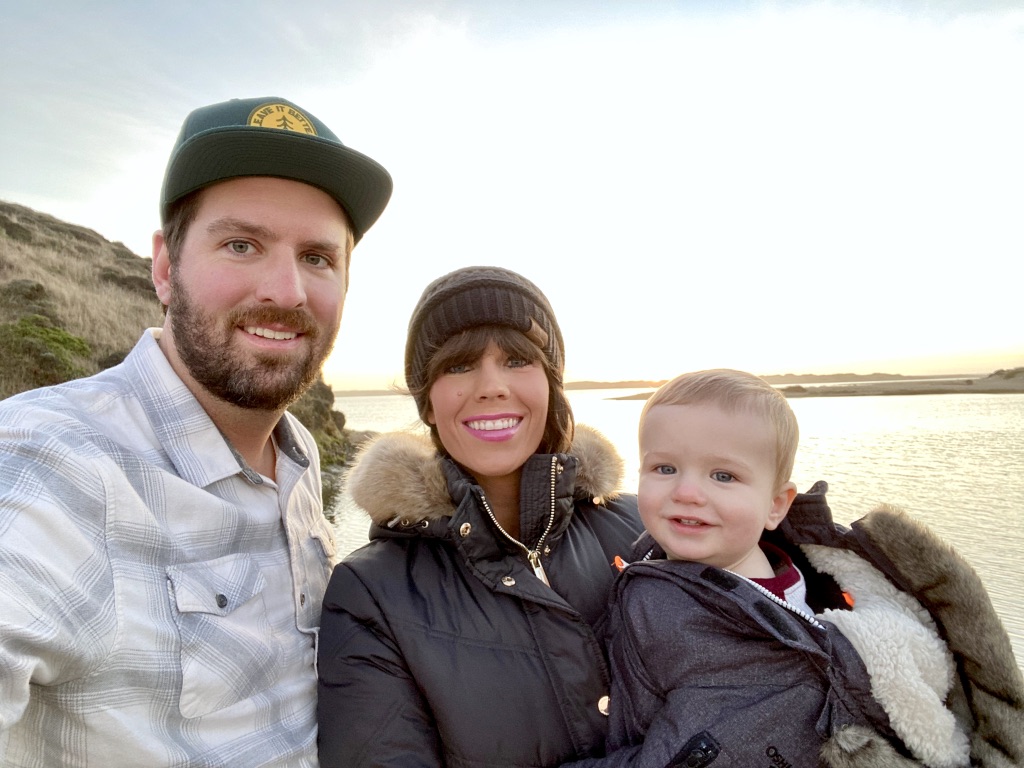Purdue graduate students juggle parenthood during a pandemic
Written by: Tim Brouk
Rigorous studies, teaching undergraduate classes, hours and hours of research: The lives of graduate students are strenuous and often spread thin. Then, add changing diapers and lining up daycare during a pandemic. For some Purdue University College of Health and Human Sciences graduate students, the pursuit of PhDs and master’s degrees includes raising a young family while working from a hectic home. Meet four students who have dealt with some hardships in the past year but also welcomed many successes while balancing motherhood with high-level research.

Meridith and Korey Bucher with daughters Brynn and Autumn. Photo provided.
‘Making sure I’m in that moment’
Twins present a unique set of challenges, of course, but so does pursuing a PhD during a pandemic. Clinical psychology PhD candidate Meredith Bucher was four years into the program before her twin daughters’ arrival. She and her husband, Korey, welcomed Brynn and Autumn in May 2019.
As she approaches the finish line after publishing 10 research papers on psychometrics and the utilization, administration and improvement of assessment measures in therapy, Bucher has not lost momentum during the pandemic and her daughters’ formative years. She credits the support of her advisor and research collaborator Doug Samuel, associate professor of clinical psychology, in helping her stay on track. But that momentum was also earned with hard work and many adjustments.
“I’ve had to rely much more on making sure I have a schedule and to-do list,” said Bucher “When the girls go down for a nap and I know I have two hours to really get work done, I can look at exactly what I’m going to do and get going on it.”
The precise schedule management included Korey’s work, too. The first months saw him at home leading virtual classes as a sixth grade English teacher. During this time, they were able to experience their daughters’ first words and steps together. But last summer, Korey accepted the dean of students job at Knox Community High School, a 90-minute drive from their Lafayette home. The family has had to lean on their bullpen of three babysitters, who were welcomed into the Buchers’ bubble before the pandemic.
Meredith Bucher said her daughters are now at an age where they can occupy each other while she gets some work done. However, if the twins require participation in a new song or game, she is happy to close the laptop and enjoy being with the girls. She has seen little Brynn and Autumn grow so much during the year of COVID-19, and the soon-to-be Dr. Bucher is thankful for every moment spent with them.
“There are going to be times where I’m just not going to be that productive, and I have to be OK with that,” Bucher said. “I’m also being more mindful about enjoying that time I have with the girls. When I’m not working, I’m making sure I’m in that moment with them.”

Amity Saha and Sabyasachy Mistry with daughter Krittika. Photo provided.
‘It was truly difficult’
Millions of parents could attest to the many stresses of daycare early in the pandemic. One of those was Amity Saha, a master’s student in the School of Hospitality and Tourism Management (HTM).
Saha reached out to a West Lafayette daycare and was told her baby, Krittika, was 111th on a waiting list to get in.
“Almost every daycare was too expensive as well,” Saha remembered. “It was truly difficult.”
In response, Saha and her husband, Sabyasachy Mistry, worked out a system where Krittika would stay at home. Much of Saha’s graduate student work as well as her job as a graduate assistant in Purdue Libraries was moved virtual last spring. The daycare experience helped inspire her thesis topic — how the pandemic has affected women working in the hospitality industry of Bangladesh, Saha’s home country.
With her husband pursuing a PhD in the Department of Chemistry, the young parents often have their hands full raising their daughter: Household chores and preparing meals must get into the schedule between research, meetings and writing. Along with the anxieties of being a new mother, concentrating on reading and writing at home is often difficult. Saha relies on a neighbor to babysit so she can get some thesis work done. When her neighbor watches Krittika in the living room while Saha takes a Teams meeting in the bedroom, there is still much work to be done.
“It’s become so hectic for me,” Saha said. “Just because you get the meeting covered, it doesn’t mean there aren’t a lot of things to do after the meeting.”
As she writes her thesis, Saha credits her Purdue Libraries supervisor, associate professor Clarence Maybee, and her HTM advisor, associate professor Jonathon Day, for providing her encouragement and understanding. She is particularly thankful for Day’s support through her thesis work.
“He’s why I’m still surviving,” Saha said. “He’s pushing me to sit down and write at least a paragraph, at least a page. I wouldn’t survive this pandemic without his guidance.”
Like many young parents, Saha’s multitasking skills have grown tenfold. The hard work and perseverance have her on track to earn her master’s degree this summer. It’s also strengthened her family.
“While the COVID experience has been horrible mentally, I’ve been able to spend a lot of time with my child and husband,” said Saha, adding she plans to apply for the PhD program with Purdue HTM. “That has been the most rewarding thing for me.”

Melissa Packer West and Landon West with son Sawyer. Photo provided.
‘I have to be flexible’
Melissa Packer West’s son, Sawyer, has had a leading role in the clinical psychology PhD student’s entire Purdue career.
“I gave birth to him about five weeks before my interview day,” Packer West recalled. “He was about 8 months old when I started my first semester.”
Sawyer, now 2, West and her husband, Landon West, are navigating a pandemic together while Packer West continues her research on personality pathology and assessment, particularly concerning the dark triad syndromes of Machiavellianism, narcissism and psychopathy.
The family was lucky to have Sawyer in daycare, sometimes. Last year, the family’s daycare centers shut down multiple times due to the statewide lockdown in spring 2020, COVID-19 infections, and power and water outages. Sawyer was home more often than not, but Packer West worked and took classes virtually. Landon West’s software engineering career, though interrupted six months due to a pandemic-related layoff, allowed him to work from home, too, which helped make things manageable.
Still, raising a toddler while balancing research, coursework, clinical work and being pregnant with their second child is not an easy task. Packer West said she upped her time-management game by utilizing multiple Google calendars at once.
“I plan things more meticulously, blocking out time for the week ahead,” Packer West added. “I have to be flexible and move things around. Aspects of my school responsibilities are on a few different calendars, and all of my meals and chores are on another. I’ve even planned out all of our weekend meals for the rest of the year by pasting recipes into the calendar.”
The disciplined approach to time management is essential because evenings are for Sawyer, her favorite entry on her Google calendars.
“When I hear Sawyer and my husband walk through the door from daycare, I wrap my work up for the time being and get dinner ready,” Packer West said. “We then try to go for walks after dinner and then play and dance with Sawyer. We just focus on him until it’s his bedtime. I’ve sincerely enjoyed my family amidst all of the chaos of the world.”
And Sawyer is ready to motivate and inspire Packer West through the next four years of PhD work.
“This past year, I’ve been able to notice and be amazed by all of the growth that he has gone through,” she said. “I can’t even believe how well he connects the dots in learning new things, how many new words he knows and how much he loves reading books.”

Elizabeth Roepke’s daughter Sophie.
Photo provided.
‘Haven’t really had a moment to breathe’
Elizabeth Roepke started her work toward a PhD in the Department of Speech, Language, and Hearing Sciences in 2016. She has put in years of research on pediatric speech disorders, namely identifying why some children have trouble making sounds correctly. For example, some children produce all “r” sounds as “w,” or all “sh” sounds as “s.”
The past year of Roepke’s Purdue career has been the most eventful so far. Well, “eventful” might be an understatement.
“It’s surreal to think that 12 months ago, lockdowns hadn’t yet started,” she said. “My daughter (Allison, now 2-years-old) was in daycare every day, and I was testing my first participants for my dissertation. Since then, I’ve caught coronavirus, had a baby (Sophie, now 6-months-old), dealt with deteriorating health from the long-term effects of coronavirus, applied for jobs, interviewed with a screaming baby on my lap, watched a toddler and baby while writing a new dissertation, and haven’t really had a moment to breathe. It’s also weird to hear from my friends without kids and hear that they get to sleep in and pursue hobbies while I’m just doing my best to keep my kids healthy and make progress on my work.”
The Roepke family coordinated their life inside their home as well as the space itself to make do. Improvisation was often the case, especially after baby Sophie’s arrival.
“We had to rearrange a lot in our one-bedroom house to try to make some room for her,” Roepke said. “I had bought the small house at the beginning of my degree, not expecting to have kids, so it’s just been a lot of trying to shuffle things around for the two kids and working from home. There’s a lot of maneuvering so that nobody can see the crib in the background during Zoom calls.”
Positioned to receive her PhD in the summer, Roepke is thankful for the support she’s received from colleagues and family. The experience has been less than ideal, but it has shaped her job search in academia.
“Wherever I go, I’ll be sure to advocate for student parents,” Roepke said.